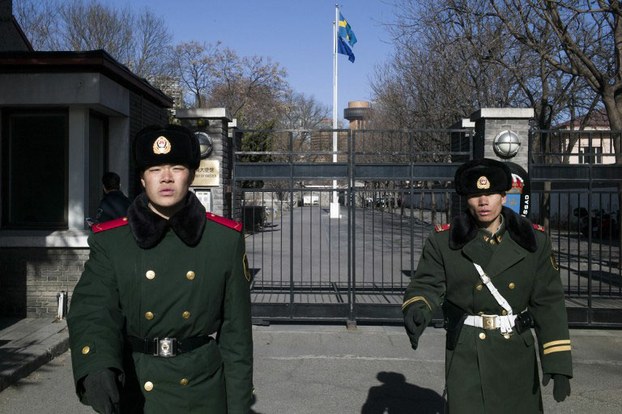China: Detained Swedish human rights worker denied meeting with embassy officials
| Publisher | Radio Free Asia |
| Publication Date | 13 January 2016 |
| Cite as | Radio Free Asia, China: Detained Swedish human rights worker denied meeting with embassy officials, 13 January 2016, available at: https://www.refworld.org/docid/56c31eea15.html [accessed 22 May 2023] |
| Disclaimer | This is not a UNHCR publication. UNHCR is not responsible for, nor does it necessarily endorse, its content. Any views expressed are solely those of the author or publisher and do not necessarily reflect those of UNHCR, the United Nations or its Member States. |
2016-01-13
 Chinese police stand guard outside the Swedish embassy in Beijing, Jan. 13, 2016. AFP
Chinese police stand guard outside the Swedish embassy in Beijing, Jan. 13, 2016. AFP
Chinese authorities have detained a Swedish human rights worker on suspicion of "endangering state security," and have prevented officials from his embassy from speaking with him, rights groups said.
Peter Dahlin, who has also gone by the name of Peter Beckenridge, was detained last week on his way to the airport by Beijing police, according to the human rights group he founded, the Chinese Urgent Action Working Group.
Dahlin's girlfriend, a Chinese citizen, is also incommunicado.
Dahlin's detention comes amid a broadening crackdown on human rights lawyers and nongovernment organizations (NGOs) in which more than 300 people have been detained, some of them later charged with subversion.
His group works to support grassroots legal advice to Chinese petitioners: ordinary citizens with complaints against the government who have grievances ranging from forced demolitions and evictions to arbitrary detention and abuse of state power.
"Despite constant requests by the Swedish Embassy, the Chinese authorities have denied direct contact with Peter and have not provided any communications from Peter to the embassy," the group said in a statement.
"Peter suffers from Addison's Disease, a rare defect of the adrenal gland, which is potentially life-threatening unless properly medicated daily," it said.
Embassy officials on Tuesday confirmed a Swedish man in his thirties was detained in China, and said they are investigating the matter.
Unable to meet
Hong Kong-based researcher for Amnesty International Patrick Poon said the rights group is following Dahlin's case closely, confirming that the Swedish embassy had so far been unable to meet with him.
"We haven't been able to confirm for the time being exactly what measures he is being held under," Poon said. "We don't know if he is under residential surveillance or criminal detention, or other kinds of detention measures."
U.S.-based rights activist Liu Qing said the Chinese authorities are more likely to detain foreign nationals on charges of "endangering state security."
"Usually China doesn't bother to explain, if foreigners get detained or beaten up by the authorities," Liu said.
"But if they want to do it more openly, then they'll use [these charges] as a way to fend off international pressure and criticism," Liu said.
Foreigners often detained
While the detention of foreign nationals in China is relatively rare, U.S.-based veteran democracy campaigner Han Lianchao said Dahlin's detention isn't without precedent.
"They have detained quite a few foreigners in the past, including Chinese people who acquired foreign citizenship," Han said.
"There was a professor from the University of Georgia a few years back who had a black bag put over her head when she was detained on her way to visit [Tiananmen massacre victims' group campaigner] Ding Zilin," he said.
"She was held for a stretch [before being released]," he said.
He said the perception that foreigners are less likely to be detained in China is inaccurate.
"The Chinese government really doesn't care if you're a foreign national; if they want to detain you, they will," he said. "China isn't ruled by law, and the government actually breaks some of its own laws."
Civil society targeted
The ruling Chinese Communist Party has stepped up its crackdown on lawyers, rights activists, and peaceful critics of the regime since President Xi Jinping took power in 2012, rights groups say.
The country is now in the grip of a "human rights crisis" sparked by the government's targeting of an increasingly vocal civil society, according to rights activists who wrote to President Barack Obama during Xi's state visit to the U.S. last September.
A recently passed National Security Law means that peaceful criticism of the government is increasingly being framed as a threat to state security, while NGO legislation in the pipeline looks set to place tight restrictions on any groups that receive funding from overseas.
Xi's administration has waged an ideology-driven campaign against "hostile foreign forces," which the government says are behind democracy and human rights activism, as well as Christian churches in China.
Reported by Hai Nan for RFA's Cantonese Service, and by Xi Wang for the Mandarin Service. Translated and written in English by Luisetta Mudie.
Link to original story on RFA website
